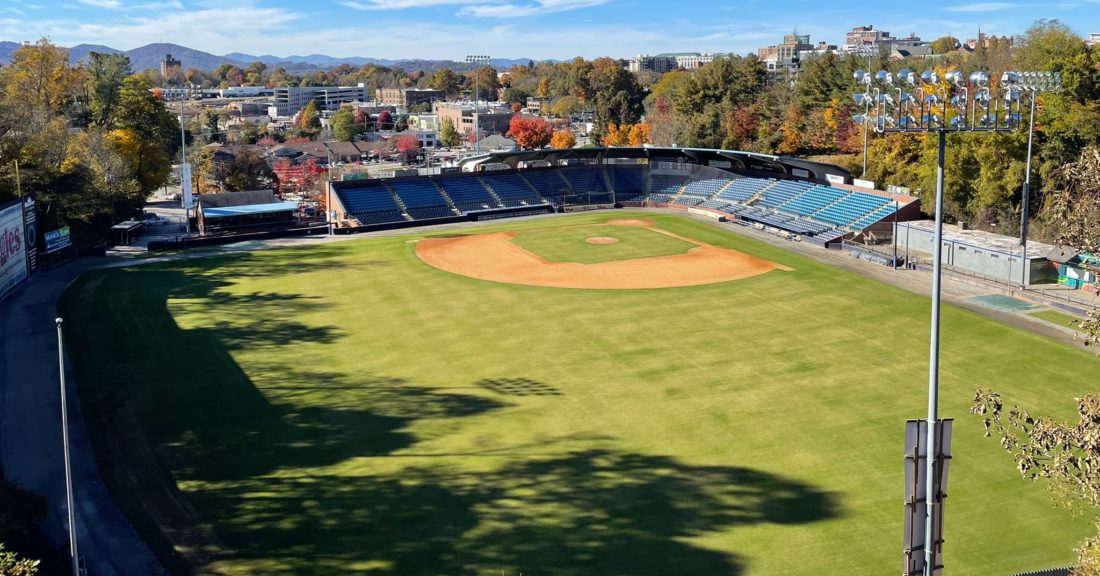It’s not quite the proverbial bottom of the ninth for minor league baseball in Asheville, but a Saturday, April 1, deadline looms for the Asheville Tourists to send Major League Baseball a financial plan for required upgrades to McCormick Field. Local governments are earnestly examining what relief they might pitch in.
The latest discussion of the matter came during a March 7 briefing of the Buncombe County Board of Commissioners. Tim Love, Buncombe’s director of economic development and governmental relations, shared a presentation outlining two potential funding scenarios that had been developed by the Tourists in collaboration with county government, the city of Asheville and the Buncombe County Tourism Development Authority.
As previously reported by Xpress (see “Safe at Home?” Jan. 18, avl.mx/chn), the Tourists have said they will relocate to a new city after the 2023 season if no plan is in place to improve McCormick Field. The current ballpark, constructed in 1992, lacks facilities for female umpires and other baseball staff, modern information technology infrastructure, a security command post and other features now mandated by the MLB for minor league stadiums.
A “minimum project” focused on the MLB’s requirements and critical facility upgrades would cost about $43.2 million over 20 years, while a “full project,” including extra amenities for fans would exceed $56.1 million over the same period. Under either scenario, Love explained, Buncombe County taxpayers would chip in $5 million.
Asheville and the tourism authority would cover the lion’s share of the remaining costs. For the full project, the tourism body would contribute $1.4 million annually for 15 years, as well as make a one-time contribution of $1.95 million taken from funds previously allocated to a streetscape project on Coxe Avenue. City taxpayers would pay $19 million over 20 years, while the Tourists organization would contribute the remainder.
The funding plans under discussion do not include any contributions from North Carolina government. Buncombe leaders have directed their lobbyists at the General Assembly to seek state support for McCormick Field; Love did not provide an update regarding those talks.
The Tourists currently pay the city of Asheville $1 per year to lease the facility. Brian DeWine, the team’s president, told commissioners that those payments would increase to as much as $475,000 annually under the proposed deal. However, that money would be applied to the stadium improvements and wouldn’t go into the city’s general fund.
Love said the project would seek to transform McCormick Field into “a community asset where people can come for other things than baseball.” During the Tourists’ offseason, for example, the ballpark could host concerts or a “winter wonderland” with light displays and ice skating.
If local governments agree to fund the improvements, Love continued, the Tourists would sign a lease committing them to play baseball in Asheville for 20 years. The team’s major league affiliate, the Houston Astros, has agreed to maintain the franchise through 2030; even after that point, Love noted, any sale or relocation of the team would have to be approved by MLB.
Board Chair Brownie Newman said the commissioners would be prepared to vote on support for the Tourists at their next meeting Tuesday, March 21. As of press time, Asheville City Council was slated to consider funding the work on Tuesday, March 14.
Buncombe to get extra $12.95M in opioid settlement funds
During the board’s regular meeting March 7, members voted unanimously to approve a new settlement in litigation against pharmacies over their role in the opioid epidemic. The county is slated to receive about $12.95 million over 15 years to support programs that address the community impacts of opioids.
The money comes on top of more than $16 million approved last year in a separate settlement with pharmaceutical companies. Buncombe has received about $2 million from those funds to date, with another $2.55 million expected in the coming fiscal year. Commissioner Jasmine Beach-Ferrara, who represented Buncombe on North Carolina’s opioid settlement working group, said the first payment from the new funds would likely arrive late this year.
“This also happens at a, perhaps we could say, serendipitous time,” Beach-Ferrara continued. “As we are tracking local data, particularly around overdose deaths, we are seeing some alarming increases in the number of folks who are dying.”
(An October presentation to the Board of Commissioners reported that the county’s annual rate of overdose deaths was 45.2 per 100,000 residents in 2021 — its highest ever and well in excess of the state average.)
Beach-Ferrara added that she had been working with fellow Commissioners Martin Moore and Parker Sloan to develop “very targeted, precise responses” to overdose deaths. She said the three planned to provide more information at the board’s March 21 briefing.




Before you comment
The comments section is here to provide a platform for civil dialogue on the issues we face together as a local community. Xpress is committed to offering this platform for all voices, but when the tone of the discussion gets nasty or strays off topic, we believe many people choose not to participate. Xpress editors are determined to moderate comments to ensure a constructive interchange is maintained. All comments judged not to be in keeping with the spirit of civil discourse will be removed and repeat violators will be banned. See here for our terms of service. Thank you for being part of this effort to promote respectful discussion.